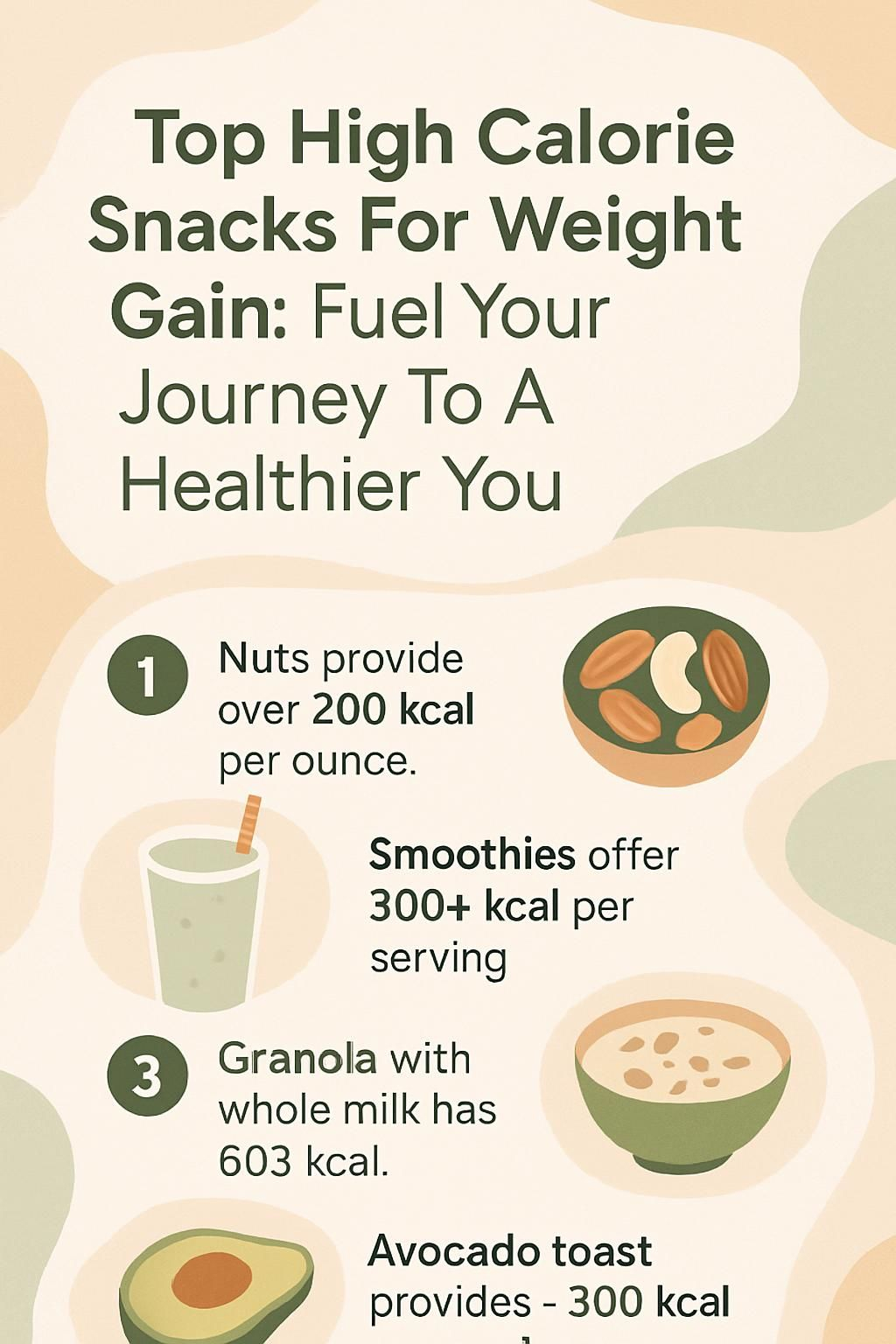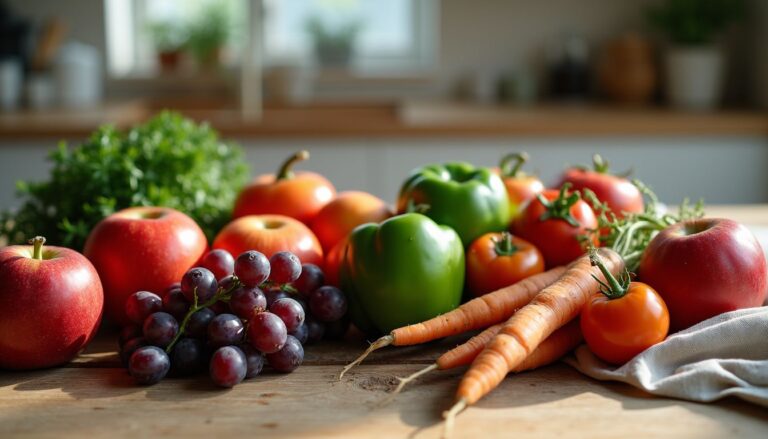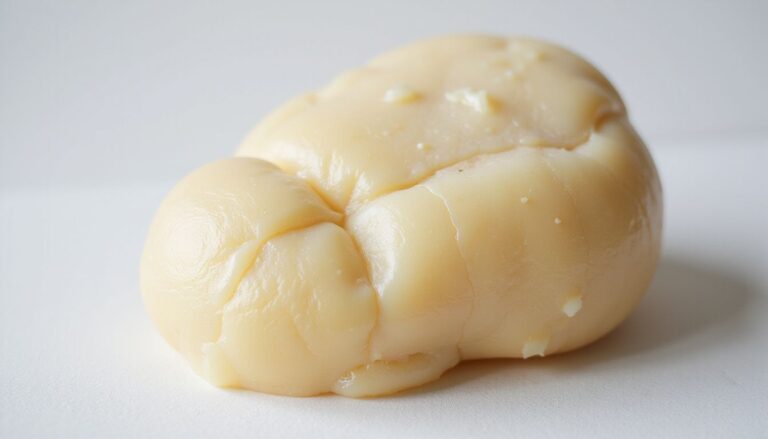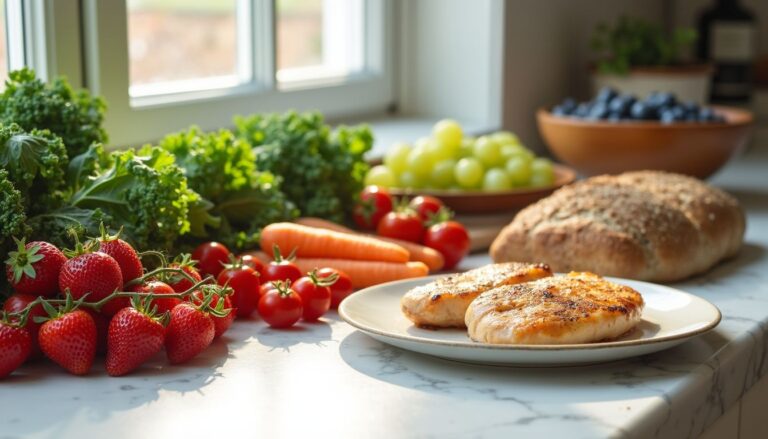Top High Calorie Snacks For Weight Gain: Fuel Your Journey To A Healthier You
Our Nutrition Assistant AI Suite will transform your body. You will lose fat, get toned, and build muscle. Gain confidence and optimal health.
You may struggle to gain weight even with three full meals. High-calorie snacks for weight gain make it easier to add extra energy without feeling stuffed. You will find practical snack ideas that use nuts, dairy, nut butter, smoothies, and more.
These choices raise your calorie intake in a nutritious way and still taste great. Use them to fuel steady progress toward a healthier you.
Key Takeaways
- High-calorie snacks like nuts, full-fat dairy, and nut butters help you gain weight without overfilling your main meals.
- Granola with whole milk, eggs, and cottage cheese add protein and healthy fat that support muscle growth.
- Smoothies blended with Greek yogurt, peanut butter, and protein powder can deliver 300 or more calories per serving.
- Nutrient-dense picks, such as avocado toast, trail mix, and dark chocolate, add calories without relying on added sugar.
- According to the CDC, being underweight raises risks for weak immunity and low bone density; frequent high-calorie snacking supports better nutrition (CDC).

Why are high-calorie snacks important for healthy weight gain?

High-calorie snacks keep your energy steady between meals. If you need to gain weight or struggle with a low appetite, these snacks let you increase calories without forcing larger portions at mealtime.
The CDC reports that being underweight can weaken the immune system and reduce bone density, which may raise the risk of osteoporosis and fertility problems. Foods such as peanut butter, nuts, dried fruit, and full-fat dairy support gradual, healthy weight gain (CDC).
Some people have fast metabolisms or medical conditions that limit how much they can eat at once. Calorie-dense snacks supply protein and healthy fats that help maintain and build muscle.
Snacking also supports daily energy and provides vitamins and minerals. Choosing nutrient-dense options helps you add mass in a healthier way, not just from added sugar.
Nutrient-dense high-calorie snacks to include in your diet
If you are trying to gain weight, focus on snacks that deliver both calories and nutrients. Nuts, whole milk yogurt, and granola are convenient, tasty, and fit into a balanced eating plan.
What are the benefits of nuts and seeds for weight gain?
Nuts and seeds offer big calories in a small serving. Macadamia nuts have about 204 kcal per ounce, pecans have about 196 kcal per ounce, and almonds provide 164 kcal per ounce with 6.01 grams of protein. These foods also supply a mix of fats and carbohydrates for energy.
Pistachios give 159 kcal per ounce and include 5.73 grams of protein plus almost eight grams of carbohydrates. Peanuts offer about 161 kcal per ounce with over seven grams of protein and nearly fourteen grams of fat.
Add nuts to trail mix, yogurt, oatmeal, or salads to raise calories without making meals huge. Nut butters like peanut or almond butter pack even more calories in a spoonful. Seed butters, such as sunflower, bring variety and nutrients.
“Nuts are easy to carry anywhere, and each handful adds flavor and calories for steady weight gain.”
Eating high-calorie snacks between meals supports muscle building and helps you increase body mass at a comfortable pace.
How do nut butters like peanut, almond, and cashew help with weight gain?
Nut butters make it simple to boost calories fast. Peanut butter has about 94.4 kcal per tablespoon. Two tablespoons on graham crackers can top 300 kcal and include 19 grams of fat.
Spread nut or seed butter on whole grain toast to add both calories and nutrients. Stir into oatmeal or blend into smoothies for extra energy on busy days.
Use nut butters as dips for apple slices or celery sticks. Roll them into protein balls for portable snacks high in calories. Dense foods like these help you eat more without feeling overly full.
Why choose Greek yogurt and full-fat dairy products for snacks?
Greek yogurt and full-fat dairy pack more calories in less volume. One cup of full-fat Greek yogurt has about 238 kcal, which is higher than regular yogurt at about 149 kcal per cup.
Whole milk offers about 152 kcal per cup with over eight grams of protein and nearly eight grams of fat. These foods provide calcium, vitamin D, and protein for bone health and muscle support.
Mix Greek yogurt with berries, granola, or nuts for a satisfying snack. Pour whole milk over cereal or oatmeal to add energy without large portions. Cheese is another smart pick; 100 grams of cheddar gives about 393 kcal and 25 grams of protein.
For more variety, cottage cheese has about 206 kcal per cup and ricotta reaches about 369 kcal per cup. Avocados also deliver healthy fats and pair well with many snacks.
How can avocados support your weight gain journey?
Avocados are rich in plant-based fats and calories, which help you add weight in a healthy way. A simple avocado toast, half an avocado on two slices of whole wheat bread, totals about 300 kcal.
These fruits provide mono and polyunsaturated fats, which support heart health while raising calorie intake. They add creaminess to meals without much volume.
Try sliced avocado on whole grain toast or chips for a quick snack. I often blended mashed avocado into smoothies in college. It added calories and a silky texture without making the drink heavy.
Avocados also bring vitamins and minerals that support balanced nutrition. Eggs are another nutrient-dense option to rotate into your snack routine.
What makes eggs a good high-calorie snack option?
Eggs give you a compact source of protein and calories. One large egg provides 71.9 kcal, 6.2 grams of protein, 4.4 grams of fat, and only 0.5 grams of carbohydrates.
Eat the whole egg to get complete protein for muscle repair. Eggs are affordable and easy to use in snacks like scrambled eggs on toast or egg salad with mayonnaise for extra calories.
For example, mash two hard-boiled eggs with one tablespoon of mayonnaise. This simple mix is calorie dense and portable. Hard-boiled eggs also travel well for gym bags or lunchboxes.
Use eggs in wraps or sandwiches, or pair with whole grain crackers. They supply good protein and healthy fats, which support steady weight gain while keeping ingredients simple.
Convenient high-calorie snack ideas for busy lifestyles
Busy schedules can make eating enough feel tough. These grab-and-go ideas help you stay on track with healthy weight gain.
How to make smoothies and protein shakes for extra calories?
Smoothies and protein shakes let you add calories quickly with simple ingredients. They fit well into a morning routine or an after-practice break.
- Use whole milk or full-fat Greek yogurt as your base to raise calories and fat.
- Add one scoop of whey protein, about 32 grams, for 113 kcal and 25 grams of protein per serving.
- Blend in nut butters. Each tablespoon usually adds 90 to 100 kcal and healthy fats.
- Include fresh or frozen fruits like bananas or berries for sweetness, vitamins, and fiber.
- Mix in seeds, such as chia, for added calories, omega-3 fats, protein, and fiber. One tablespoon has roughly 60 kcal.
- Try silken tofu in a blueberry blend for more protein and a creamy texture.
- Sweeten with honey or maple syrup if you need extra energy in each cup.
- Top a smoothie bowl with granola or dried fruit for crunch and more calories.
- Add a drizzle of olive oil to boost calories without changing taste much. One tablespoon adds about 119 kcal.
- Pair your drink with eggs, nut mixes, or cheese to support muscle growth.
I often blend bananas with Greek yogurt and peanut butter after morning exercise. The taste is great, and it helps me gain weight slowly but consistently.
What is a healthy trail mix with dried fruits and chocolate?
Homemade trail mix delivers steady energy between meals. Combine nuts, dried fruit, seeds, and chocolate pieces for a calorie-dense blend.
Try almonds or macadamias with raisins, dried apricots, dates, banana chips, and dark chocolate chunks. Add granola to raise calories further. One hundred grams of granola contains about 451 calories (USDA).
DIY mixes let you control added sugar and flavor. Keep small bags in your backpack or desk for quick snacks. You can also sprinkle your mix over strained yogurt.
How to prepare whole grain toast with nut butter or avocado?
Whole grain toast brings fiber and steady energy. Topping it with nut butter or avocado adds healthy fats for weight gain.
- Toast two slices of whole grain bread until golden.
- Spread 2 tablespoons of peanut, almond, or cashew butter over the warm slices. This adds 300 or more calories plus protein.
- For a savory option, mash half an avocado on the toast. You will add about 300 calories and heart-healthy fats.
- Sprinkle chia or sunflower seeds for extra protein and fiber that supports gut health.
- Drizzle a little honey or add fresh berries for sweetness and antioxidants.
- Pack the toast in foil or a container for a portable high-calorie snack.
- Change toppings with items like roasted chickpeas, thin-sliced salmon, bacon bits, or a spoon of Greek yogurt.
- Pair the toast with a hard-boiled egg to increase protein for muscle building.
- Add a glass of whole milk or a protein shake to further increase calories during the day.
Why are cheese and crackers good high-calorie snacks?
Cheese and crackers are simple, high-calorie, and satisfying. One ounce of cheddar provides about 120 kcal, and feta offers about 75 kcal per ounce.
Cheese supplies calcium and protein for strength and bone health. Whole grain crackers bring carbohydrates for steady energy.
Pair cheese with whole grain crackers and sliced vegetables for more nutrients. String cheese works well when you need a portable option. Add cheese to salads, sandwiches, or eggs for easy extra calories.
High-calorie snacks that support muscle building
Protein-rich, high-calorie snacks help repair muscle and keep your energy up. Aim for foods that fit both your goals and your schedule.
How does cottage cheese with honey or fruits help muscle gain?
Cottage cheese paired with honey or fruit feeds your muscles for hours. One cup of large curd cottage cheese has about 206 calories, 23.3 grams of protein, and 9 grams of fat.
Its casein protein digests slowly, so amino acids stay available for longer. Adding honey or sliced bananas raises calories quickly and supports lean mass gains.
Boost your bowl with nuts or dried fruits like raisins or dates. Try blueberries, spiced applesauce, or even a few avocado slices for extra nutrition.
I often pack cottage cheese parfaits with granola after lifting. Full-fat ricotta, about 369 kcal per cup, is another rich dairy option when you need more calories (USDA).
When should you use protein bars and powders?
Protein bars and powders help when your schedule is tight or your meals fall short. Use them if you cannot cook or you need more protein and calories for recovery.
One scoop of whey powder, about 32 grams, delivers about 113 calories and 25 grams of high-quality protein with only about 0.5 gram of fat. Blend it into smoothies with whole milk or stir it into oatmeal.
You can also bake energy bites with a scoop of powder. Grab a protein bar after exercise to support recovery. Choose bars lower in added sugar.
During a busy semester, I kept nut-based bars in my backpack. They saved me from skipping meals on long days.
Why include hard-boiled eggs in your snack routine?
Hard-boiled eggs are portable and nutrient dense. One large egg has 71.9 kcal, 6.2 grams of protein, and 4.4 grams of fat with almost no carbohydrates.
Eggs provide complete protein, which supports muscle growth and repair. Pair them with cheese for more calories or mash onto whole grain toast with avocado for healthy fats and fiber.
Egg salad made with mayonnaise increases calories for a richer option. Eggs work before or after workouts and fit most budgets.
Simple foods like eggs and cottage cheese make frequent snacking easier during weight gain efforts.
What role does granola with whole milk play in muscle building?
Granola with whole milk creates a calorie-dense snack that supports training. One hundred grams of granola contains about 451 calories, 7.17 grams of protein, 17.5 grams of fat, and 66.3 grams of carbohydrates. A cup of whole milk adds about 152 calories and extra protein (USDA).
This combo supplies quick carbohydrates and steady protein for recovery. Add nuts or seeds to raise calories further and supply helpful micronutrients.
I often used this pair before morning workouts. It kept my energy high without feeling heavy.
Sweet high-calorie snack options for weight gain
Sweet snacks can be calorie dense and still support your goals. Use them to keep eating enjoyable while you build healthy weight.
How does dark chocolate contribute to calorie intake?
Dark chocolate is a compact calorie source. One ounce provides about 150 calories, so small portions go a long way.
Break it into trail mix with nuts and dried fruit or sprinkle pieces on Greek yogurt with granola. Make a simple quinoa dark chocolate bark. Stir eight ounces of melted dark chocolate with half a cup of crisp quinoa, freeze, and break into chunks.
Dark varieties also supply antioxidants with less added sugar than many milk chocolates. Pair chocolate squares with nut butter for more calories and flavor.
Why is banana with peanut butter a good snack?
Banana with peanut butter delivers fast energy and staying power. The banana provides quick carbohydrates. Peanut butter adds protein and healthy fats.
Two tablespoons of peanut butter on graham crackers can pass 300 calories and 19 grams of fat. Bananas also bring potassium, which supports muscle function.
This snack is portable for school, work, or the gym. Spread peanut butter on banana slices or mix both into oatmeal or yogurt.
What are energy bites or protein balls and how to use them?
Energy bites are small, no-bake snacks that pack carbs, fat, and protein. They travel well and help you hit daily calorie goals.
- Combine 1 cup oats, 3 tablespoons honey, and ⅔ cup peanut butter. Add chocolate chips or dried fruit for more calories.
- Roll into small balls for easy storage and transport.
- Each bite blends complex carbs from oats, quick energy from honey, and protein plus fat from peanut butter.
- Add a scoop of protein powder if you want more protein and calories after training.
- Store them in an airtight container in the fridge for ready-to-eat snacks.
- Eat a couple before workouts for energy or afterward to support recovery.
- Swap almond or cashew butter for new flavors with similar nutrition.
- Stir in chia or ground flax for extra fiber and omega-3 fats.
- Use them on busy days when cooking is hard.
- Pair with a glass of whole milk or Greek yogurt for an even bigger calorie boost.
- Many athletes like these snacks because they are easy to carry and help control hunger between meals.
When to enjoy full-fat ice cream or milkshakes for extra calories?
Full-fat ice cream and milkshakes raise your daily calories with little effort. Enjoy them after lunch or dinner. Or blend a milkshake with whole milk, protein powder, and fruit between meals.
Full-fat versions contain more calories than low-fat products because of higher fat content. During college, I often drank a chocolate peanut butter shake after soccer practice. It helped me meet my targets without feeling stuffed.
Adding nuts or nut butter increases calories and nutrients. Top ice cream with chopped dark chocolate or banana slices for an indulgent high-calorie snack.
Savory high-calorie snack options to try
Savory snacks can be rich in calories and full of flavor. Rotate these ideas to keep your routine interesting.
How to make guacamole with whole grain chips?
Guacamole with whole grain chips offers healthy fats, fiber, and steady energy. It is easy to make and simple to scale for the week.
- Mash two ripe avocados in a bowl.
- Add diced tomatoes, chopped onion, and fresh lime juice for flavor and vitamin C.
- Season with sea salt and fold in chopped spinach for more nutrients.
- Serve with whole grain chips for complex carbohydrates that support energy needs.
- Refrigerate extra guacamole in a sealed container for quick snacking.
- Top with shredded cheese or salsa if you want extra calories and variety.
- Use guacamole as a spread on toast or wraps to raise daily calories.
- Whole grain chips contain more fiber than many regular chips, which can support digestion.
For another savory option, try tuna salad with crackers.
What makes tuna salad with crackers a good snack choice?
Tuna salad with crackers delivers protein and calories in a small package. Use full-fat mayonnaise or mashed avocado to increase energy per serving.
Whole grain crackers add complex carbohydrates for lasting fuel. A serving often reaches 250 to 350 calories, especially with a drizzle of olive oil.
Chopped celery or bell pepper adds vitamins and fiber without cutting calories much. This snack is portable, so it fits a busy schedule.
I keep tuna salad and wheat crackers in the fridge for post-workout snacking. It is quick and satisfying.
How to prepare sweet potato toasts with toppings?
Sweet potato toasts are a gluten-free base that holds many toppings. Prep a batch for fast snacks during the week.
- Wash and slice sweet potatoes lengthwise into quarter-inch slabs.
- Roast at 400°F for 25 minutes, flipping once, until tender with crisp edges.
- Cool before topping to keep texture.
- Spread peanut or almond butter for healthy fats and extra calories.
- Add avocado slices and a drizzle of olive oil for more monounsaturated fat.
- Top with cottage cheese, seeds, or sliced hard-boiled egg to raise protein.
- Use cheese or Greek yogurt for savory versions that support muscle growth.
- Try sweet or savory mixes like fruit preserves or crumbled bacon.
Next, consider roasted chickpeas or edamame for quick, crunchy snacks.
Why snack on roasted chickpeas or edamame?
Roasted chickpeas and edamame deliver plant protein and convenient calories. A half-cup of roasted chickpeas has about 120 calories and 6 grams of protein.
Roasted or seasoned edamame offers similar benefits. Both can be made ahead and carried in small containers, which supports consistent eating.
Chickpea wraps with feta and flatbread increase nutrients and keep you full. These beans and soybeans also bring fiber and minerals like iron and magnesium.
People rebuilding strength after illness often need extra calories. These snacks help meet that need without heavy oils or added sugar. They provide a crunchy alternative to chips and support a healthy plan.
How can you effectively incorporate high-calorie snacks into your diet?
Adding high-calorie snacks to your day does not need to be complicated. Small, steady steps make a big difference over time.
Why eat smaller, frequent meals throughout the day?
Smaller, frequent meals spread calories across the day and prevent overfilling. This approach helps if your appetite is low.
Eating every two to three hours creates chances to include toast with nut butter or cheese and crackers. It also helps reduce energy dips since nutrients arrive regularly.
Many people digest several small meals better than a few large plates. During my own weight gain phase last year, this pattern made extra snacks comfortable.
How to add healthy oils or butter to your meals?
Simple add-ons raise calories without much volume. Drizzle avocado or olive oil on salads, toast, or roasted vegetables.
Cook eggs or omelets in olive oil. Sauté vegetables with a spoonful of butter to boost flavor and help absorb fat-soluble vitamins A, D, E, and K.
Spread nut butter on whole grain toast for a quick calorie lift. Add healthy oils or melted butter to pancakes or waffles at breakfast. One tablespoon of olive oil at a meal contributes about 120 calories, which can move you closer to your goal.
What beverages pair well with high-calorie snacks?
Whole milk is a strong partner for high-calorie snacks like toast with nut butter or a bowl of granola. One cup has about 150 calories, calcium, and vitamin D for bone health.
Full-fat smoothies and milkshakes made with whole milk or yogurt add flavor and calories. Blend fruit with full-fat Greek yogurt for more protein and energy.
Hot chocolate made with whole milk pairs well with banana on toast or a few squares of dark chocolate. Protein shakes mixed with whole milk help you combine extra calories with muscle support.
A big mug of hot chocolate alongside homemade trail mix often helped me meet my calorie target during long study sessions.
How to keep snacks accessible for convenience and consistency?
Pre-portion nuts, protein balls, and dried fruits into small containers or bags. Keep them on the counter or at eye level in the pantry.
Place cheese and crackers, yogurt cups, and ready-to-toast bread in clear bins in the fridge. Store spreads and dips nearby so you can increase flavor and calories quickly.
Introduce one new high-calorie snack each day. Use portable containers if you spend time away from home. This habit supports regular eating and steady progress.
What are the potential risks of being underweight?
Being underweight can affect many body systems. High-calorie snacks for weight gain can help you close nutrient gaps and restore strength.
How do nutritional deficiencies affect health?
Nutritional deficiencies can raise the risk for infertility, bone loss, and hormonal issues. Low intake of key nutrients may also increase infections and slow recovery.
Low calcium and vitamin D can weaken bones and raise fracture risk. Mental health can suffer too. Some studies link poor nutrient intake with higher rates of depression.
Eating calorie-dense foods rich in vitamins and minerals helps prevent these issues. Talk with a healthcare professional if you notice symptoms of deficiency so you can get a personalized plan.
Why is a weakened immune system a concern?
A weak immune system makes infections more likely and recovery slower. Underweight people often miss nutrients their bodies need to fight germs.
If body weight is low, your immune response may not work at full strength. Many people report more frequent colds and flu when intake is too low.
Healthy weight gain with nutrient-dense snacks supports your immune defenses. During my own recovery from illness, I had fewer sick days after raising my calorie intake with balanced snacks and meals.
How does low body weight reduce energy levels?
Low body weight often means your intake does not match your needs. With fewer stored reserves, the body has less fuel for daily activity.
Deficiencies in iron and B vitamins can add to fatigue. Exercise and routine tasks may feel harder than they should.
After an illness, I struggled with energy until my intake improved. Many people feel better once they add high-calorie snacks and regular meals to support their goals.
What strategies promote healthy weight gain?
Healthy weight gain works best with a clear plan. Focus on calorie-dense foods, consistent meals, and a balance of protein, carbohydrates, and fats.
Why focus on calorie-dense, nutrient-rich foods?
Calorie-dense, nutrient-rich foods help you eat more without large portions. Nuts, dried fruit, and full-fat dairy add energy along with vitamins, minerals, and protein.
Full-fat products increase daily calories better than low-fat versions. Protein-rich snacks like Greek yogurt or a scoop of protein powder improve both calories and nutrition.
Balanced, higher-calorie meals such as hearty breakfast plates or pasta with rich sauces can support steady progress. Clinicians often recommend this approach because it supports weight gain while protecting overall health.
How to combine protein, carbohydrates, and healthy fats effectively?
Build snacks with all three macronutrients. Protein repairs tissue, carbohydrates fuel activity, and fats raise calories and help absorb vitamins.
Try almond butter on whole grain toast for plant protein, complex carbs, and healthy fats. Combine Greek yogurt with banana and walnuts for dairy protein, fast energy, and omega-3 fatty acids.
Stir oats with whole milk and peanut butter for a filling bowl. Make trail mixes that blend dried fruit with seeds or nuts. Ask a registered dietitian for help if you need a tailored plan.
What foods should you avoid for healthy weight gain?
Limit snacks that offer empty calories, such as candy, chips, and sugary drinks. These items often contain added sugar or unhealthy fats but few nutrients.
Fried foods, pastries, soda, many energy drinks, and fast food can lead to fat gain rather than healthy weight gain. Some people also choose to limit beverages with artificial sweeteners.
During a sports season, I made better progress by choosing whole foods like nuts, fruit, and Greek yogurt instead of heavily processed snacks.
Conclusion
Choosing the right high-calorie snack can make gaining weight easier and more comfortable. Nuts, Greek yogurt, smoothies, nut butter, and granola deliver calories along with protein and healthy fats.
Enjoy these snacks between meals to add energy without feeling overly full. Whole milk, cottage cheese, and avocado toast also raise your daily intake while supporting bone and muscle health.
Keep snacks prepped so you can eat regularly, even on busy days. This article is for education only. For medical advice, talk with your clinician, especially if you are underweight due to a health condition. With steady habits and nutrient-dense foods, you can reach a healthy weight and feel stronger.
FAQs
1. What are the best high calorie snacks for healthy weight gain?
Nut butters, trail mix with dried fruit and seeds, full-fat Greek yogurt, granola bars made with oats and honey, and cheese cubes offer dense calories. These foods provide protein, healthy fats, and essential nutrients that support muscle growth as well as overall health. According to the USDA FoodData Central database, a two-tablespoon serving of peanut butter contains about 190 calories while one ounce of mixed nuts provides around 170 calories.
2. How often should I eat high calorie snacks to promote weight gain?
Eating every three to four hours helps maintain a steady intake of energy throughout the day. Consistent snacking between meals can increase your total daily caloric intake without making you feel overly full at mealtimes. A registered dietitian from Mayo Clinic recommends adding two or three nutrient-rich snacks each day for effective results.
3. Are there risks in choosing processed high calorie snacks over whole food options?
Processed snack foods like chips or pastries may contain added sugars or unhealthy fats which could raise cholesterol levels according to Harvard Health Publishing research. Whole food choices such as avocados or hard-boiled eggs deliver more vitamins and minerals per bite; they also help regulate blood sugar better than highly processed items.
4. Can personal experience guide my choice of high calorie snacks for weight gain?
Personal preferences play an important role in sustaining new eating habits long term. For example, after struggling with low appetite during recovery from illness I found that blending smoothies using nut butters and milk allowed me to add extra calories without discomfort or loss of interest in eating solid foods.
Summary: High calorie snacks like nut butters, trail mix with dried fruit and seeds, full-fat dairy products such as Greek yogurt plus whole grain granola bars support healthy weight gain when eaten regularly throughout the day instead of relying on heavily processed foods alone; individual taste preferences can make this process easier to sustain over time.







